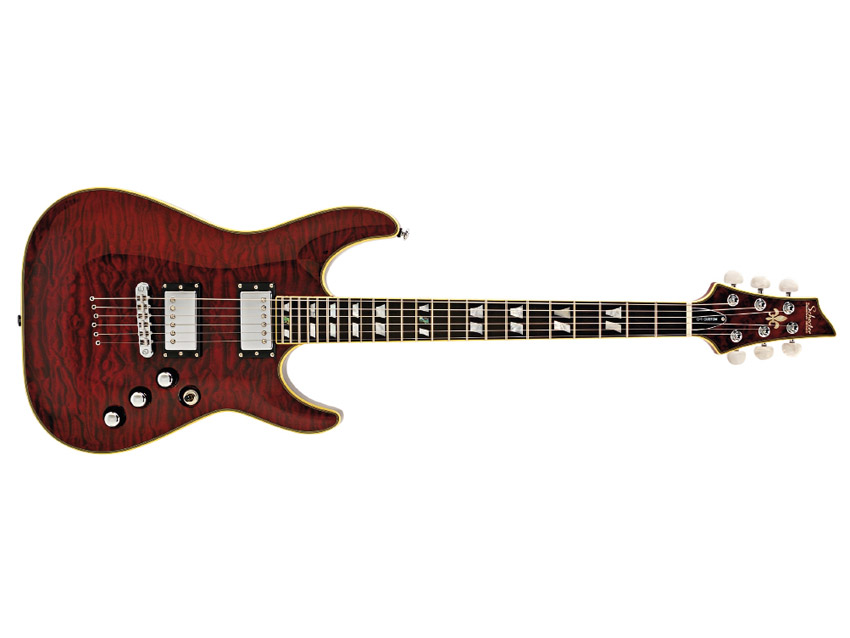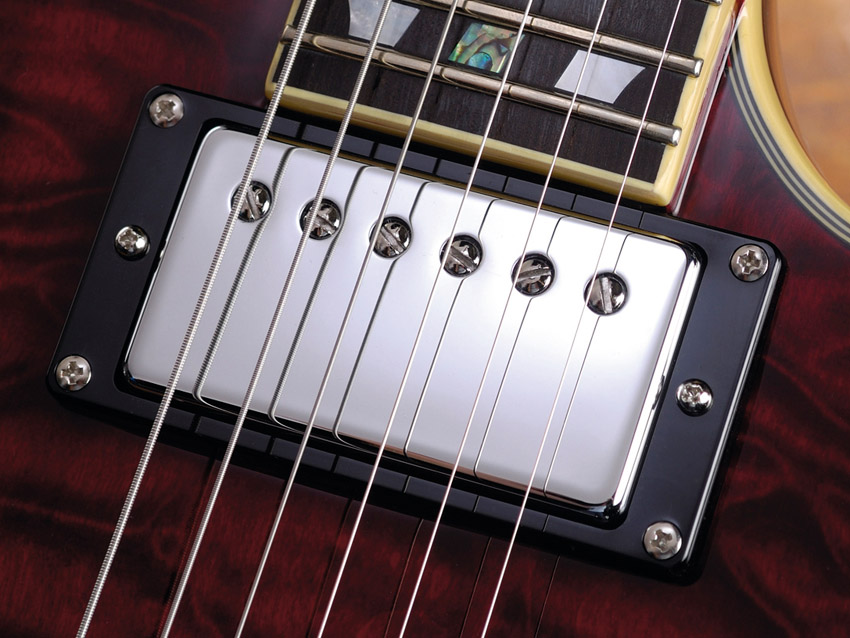MusicRadar Verdict
The SH-11 in the bridge gives a refreshingly distinct tone that's usable for just about anything - in short this is an impressive guitar.
Pros
- +
Appearance. Versatile tonal performance. Great neck.
Cons
- -
At this price, with these features, nothing.
MusicRadar's got your back

Schecter C-1 Custom

Schecter C-1 Custom

Schecter C-1 Custom

Schecter C-1 Custom
Even a cursory glance at Schecter's website reveals a huge choice of guitars. Indeed, as a player in the market for a new rock guitar it can be confusing to nail down a specific model when browsing.
The USA-based company is clearly aware of this and the two guitars in the new C-1 family represent the first move towards streamlining and standardising the range, without necessarily deleting current models that may not fit into the new order.
Three body shapes, the C-1, the offset double-cut Tempest, and LP-style single-cutaway Solo-6, will now be available in either Standard or Custom configurations. An additional choice is the Hellraiser Series, whose distinction is based on spec rather than body-shape: each associated model features an EMG pickup set and Schecter locking tuners (unless loaded with a double-locking Floyd Rose vibrato) and, if finished in trans black cherry, a quilted maple top.
What remains above all is the brand's build quality, value for money and versatility - facets that the new C-1 models possess in spades.
"The C-1 Custom is far more versatile than we had assumed. What's more it plays well and looks pretty cool too."
As expected from the Custom suffix this guitar is the fancier of the two C-1 options and all four trans finish options allow the guitar's heavily-quilted maple top to peep through very nicely indeed.
It's a slightly arched design that offers a nod in the direction of the classic Jackson Soloist as far as vibe is concerned and is top-edge bound in cream plastic. There's a belly contour, but no forearm carve and the cutaways, although not as expansive as those featured on an Ibanez JEM, give excellent access to all 24 medium-sized frets.
The 42mm wide nut is Graph Tech's Tusq, a synthetic form of ivory, and the neck profile - best described as a flattened 'D' - is comfortable and straightforward to get on with.
Want all the hottest music and gear news, reviews, deals, features and more, direct to your inbox? Sign up here.
Its ebony fingerboard sports a series of split-block mother-of-pearl inlays that expand to include a further central sliver of abalone at the 12th and 24th frets.
The tuners - a sextet of chrome Schecter-logo'd locking types - are tipped with pearloid buttons that add a touch of luxury to the guitar's overall vibe, and the action has been ideally set - low enough for comfort, high enough to give a little bit of fight.
The body is constructed from a three-piece spread of solid mahogany and is finished in the same colour as the top, a feature that's also applicable on all four colours; the neck and headstock are also coloured in the same hue as the top.Powering comes from a Seymour Duncan Custom master tone that doubles as a push/pull coil split.
Sounds
Like Slash's signature humbucker, the Custom Custom pickup is based around an Alnico II magnet and it's intended to provide a warm and rounded PAF-style tone with extra output suited to more modern styles.
As arguably one of Seymour's lesser-known units, it provides an excellent voice that, as suggested, gives a traditionally-voiced classic rock rhythm sound that also incorporates a heightened trebly edge.
Enhanced by the tonal influence of the maple top and ebony fingerboard, the toppy nature is great for modern metal and associated uses and, thanks to the fat mahogany body, you're never short of depth and girth either.
The mellower '59 at the neck - a pickup that's specifically designed to recreate those lusted-after late fifties Gibson tones - is an excellent companion and demonstrates a far subtler, albeit wholly discernible, brittle edge.

This overcomes the undeniable push provided by the mahogany to give a vibrant sound that's equally at home with a clean jazz amp setting as it is to the intro to Sweet Child O' Mine.
With the master coil-split giving a further trio of spiced-up Fender-flavoured tones - the hot Strat quality of the split neck selection is our favourite here - the C-1 Custom is far more versatile than we'd assumed. What's more, it plays well and looks pretty cool too.
If you can afford the Custom's acceptable £679 price, you should wholeheartedly make the deal. It's a guitar that's better looking than its Standard model counterpart and, more importantly, one that sounds far better.
Simon Bradley is a guitar and especially rock guitar expert who worked for Guitarist magazine and has in the past contributed to world-leading music and guitar titles like MusicRadar (obviously), Guitarist, Guitar World and Louder. What he doesn't know about Brian May's playing and, especially, the Red Special, isn't worth knowing.